Views
Enforceability Denied! When the SICC’s Authority Stopped at India’s Gate
Written by Tarasha Gupta, BALLB (Hons), Jindal Global Law School, and Saloni Khanderia, Professor, Jindal Global Law School (India)
The Singapore International Commercial Court (“SICC”) has become a preferred hub for hearing litigation and arbitration of international commercial disputes. Accordingly, many decisions from the SICC require recognition and enforcement in India.
In this light, a recent judgment from the Delhi High Court (“HC”) is a significant development providing relief to those wishing to enforce the SICC’s judgments in India. In Discovery Drilling Pte Ltd v. Parmod Kumar & Anr,[1] the HC has held that the SICC is a superior court under Section 44A of the Code of Civil Procedure, 1908 (“CPC”). As a result, its judgments can be directly executed in India. That said, the HC ultimately held the judgment in question to be unenforceable, as it failed to meet the tests in Section 13 of the CPC.
This article breaks down the arguments and legal context behind the HC’s judgment. It also highlights how the case demonstrates flaws in India’s regime, which create difficulties not just for creditors trying to enforce foreign judgments in India, but also in enforcing India’s judgments abroad. Read more
Sovereign Immunity and the Enforcement of Investor–State Arbitration Awards: Lessons from Devas V. India in Australia, The United Kingdom and India
Written by Samhith Malladi, Dual-qualified lawyer (India and England & Wales), and Senior Associate, Shardul Amarchand Mangaldas [Bombay office]; and Niyati Gandhi, Partner, Dispute Resolution, Shardul Amarchand Mangaldas [Bombay office]
The Recalibration of Enforcement Doctrine
The global campaign to enforce arbitral awards against the Republic of India arising from its long-running dispute with Devas Multimedia has witnessed a significant doctrinal shift in the treatment of sovereign immunity within the enforcement of investor–state dispute settlement (ISDS) awards.
To recall, the dispute arises from a contract entered in 2005 between Devas Multimedia Private Limited (Devas) and the Indian state-owned Antrix Corporation (Antrix), which was the commercial arm of the Indian Space Research Organisation. Antrix had agreed to lease S-band spectrum to Devas to broadcast its multimedia services in India. Antrix terminated this contract in 2011 citing national security concerns. In a nutshell, the dispute spawned three concluded arbitrations – a commercial ICC arbitration between Devas and Antrix and two investor-state arbitrations between Devas’ shareholders and India under the India-Mauritius Bilateral Investment Treaty (BIT) 1998 and the India-Germany BIT 1995. In 2022, Devas’ Mauritian shareholders commenced another investor-state arbitration against India under the India-Mauritius BIT in relation to India’s efforts to thwart the award against Antrix in the ICC arbitration, which currently remains pending before the Permanent Court of Arbitration. An overview of the various proceedings arising from this dispute has been previously discussed on this blog here. Read more
Conflict of Law Rules in the Early 20th Century Ethiopia: A Brief Legal History
Guest post by Bebizuh Mulugeta Menkir, former Lecturer of Laws in University of Gondar, currently working as a Lawyer and Senior National Consultant for a legal reform project. E-mail: babimulugeta@gmail.com
The Ethiopian legal system is characterized by the absence of codified rules on conflict of laws. Though it cannot be considered as the exact period in which conflict of laws have emerged in Ethiopia, some elements of such rules can be found even in the early 1900s, which is long before the modern codes were developed in 1950s and 1960s.
A book written by Mersehazen Woledekirkos titled “Ye Hayagenawe Keflezemen Mebacha:Ye Zemen Tarik Tezetaye Kayehute ena Kesemahute 1896–1922”[1] is a record of historical events that happened in 20th century Ethiopia. One of the records is the “Trade Agreement (1908)” that was signed between Ethiopia and France. This agreement, among others, regulates the adjudication of disputes between Ethiopian and French nationals/dependents. This short piece aims to briefly discuss the salient conflict of laws rules that are incorporated in this trade agreement. Read more
News
Revue Critique de droit international privé – issue 2025/1
 Written by Hadrien Pauchard (assistant researcher and doctoral student at Sciences Po Law School)
Written by Hadrien Pauchard (assistant researcher and doctoral student at Sciences Po Law School)
The first issue of the Revue Critique de droit international privé of 2025 has just been released. It gathers six contributions honouring Albert Armin Ehrenzweig and his legacy, as well as seven case notes and numerous book reviews.
The doctrinal part of the volume is devoted to the proceedings of the Albert Armin Ehrenzweig Conference organized in June 2024 at the University of Vienna, fifty years after the passing away of the great author. The contributions commemorate both the man and the scientist, testifying to the relevance of Albert A. Ehrenzweig’s scholarship to contemporary private international law. They are published in French in the printed version of the Revue (also available online here), and will be available shortly in English (here).
Out Now: Dickinson, Natural Justice in Recognition and Enforcement of Foreign Judgments, Recueil des cours, Tome 446
Last summer, Andrew Dickinson (Professor of the Conflict of Laws, University of Oxford, and former editor of ConflictofLaws.net) delivered a special course at the summer course of the Hague Academy of International Law entitled ‘Natural Justice in Recognition and Enforcement of Foreign Judgments’. It has now been published as Volume 446 of the Recueil des cours / Collected Courses.
The blurb reads as follows:
This special course assesses the utility of ideas of ‘natural law’ and ‘natural justice’ as tools to explain, rationalise and develop the rules governing the recognition and enforcement of foreign judgments currently applied by the world’s legal orders.
After introducing the topic, the first part of the course consider how influential 17th and 18th century accounts of the law of nature sought to account for the relations existing between all human beings, as well as the creation of political societies with law-making powers, the global ordering of those societies and the role of adjudication as a means of resolving disputes within and among them. This provides the historical and intellectual background for what follows.
The principal part of the course considers how writers on the conflict of laws in this period drew upon and utilised these ideas, as the rules that we apply today to regulate foreign judgments began to take shape. This leads to a study of the further evolution of the legal landscape in the 19th century, highlighting the use of natural law reasoning by judges and commentators to explain and justify the effectiveness of individual exercises of adjudicatory authority beyond their original domains, as well as the later rejection of natural law thinking in favour of models centred on ideas of sovereignty and territoriality, which continue to dominate today.
Having completed this historical survey, the course examines the specific legacy of natural law reasoning in the common law world, involving the use of principles of ‘natural justice’ to deny recognition of unjust foreign judgments, as well as the counterparts of these principles in other legal systems and international treaties.
Drawing on the preceding material, the concluding chapter considers the case for renaturalising the law in this area, and the implications of following this path.
More information on the book can be found here.
It is available to subscribers to the Recueil des cours here.
AMEDIP: Annual seminar to take place from 22 to 24 October 2025 (in Spanish)

The Mexican Academy of Private International and Comparative Law (AMEDIP) will be holding its XLVIII Seminar entitled “Reflections regarding the Inter-American system in the 50th Anniversary of the CIDIP-I and the latest developments of Private International Law in Mexico” (Reflexiones en torno al sistema interamericano en el 50 Aniversario de la CIDIP-I y la actualidad del Derecho Internacional Privado en México) from 22 to 24 October 2025. The venue of the seminar will be the Universidad Autónoma de Querétaro (Querétaro, Mexico). Read more



